Conservatives to 2016 GOP field: Defy us at your own peril
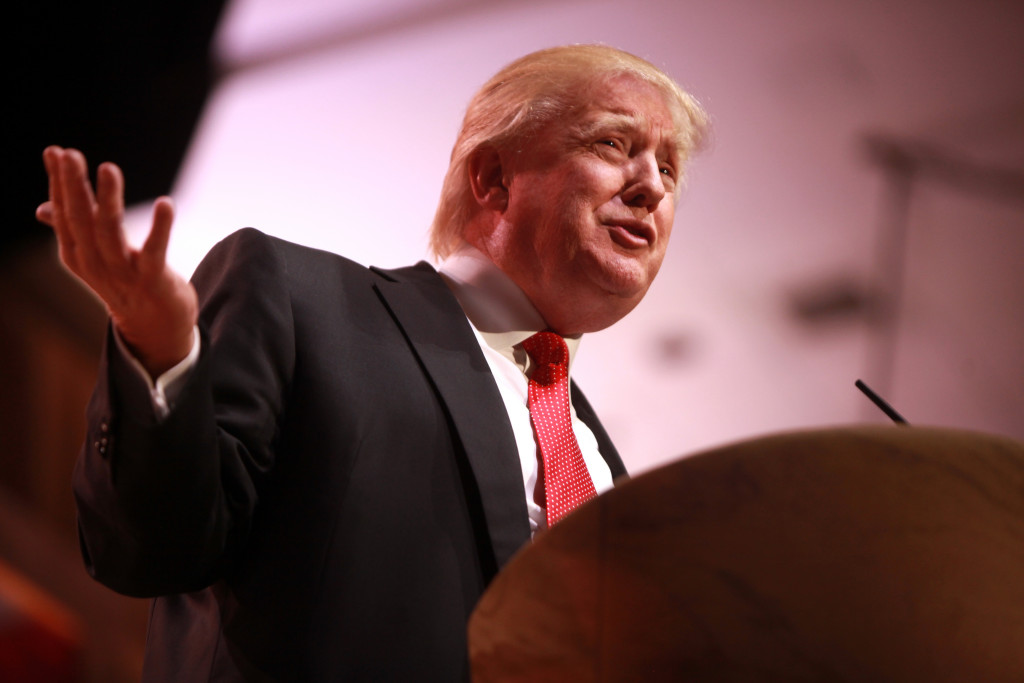
The Republican Party’s conservative wing, pumped up by House Speaker John Boehner‘s stepping down, is warning the 2016 presidential candidates that defying its wishes will come at their peril. Religious activists forcefully conveyed this message Saturday: embrace our uncompromising stance against abortion rights and gay marriage, among other priorities, even if doing so risks a federal government shutdown. An emboldened conservative movement signals fresh trouble for White House candidates viewed by the party’s frustrated base as insufficiently committed to their cause. Chief among them is former Florida Gov. Jeb Bush. “Conservatives are on fire at the moment,” said Gary Bauer, a former president of the Family Research Council. He was among the featured speakers at the Values Voter annual conference that brought an estimated 2,000 evangelical activists to Washington this weekend. Boehner’s announcement that he would resign from Congress by the end of October came without warning Friday, nearly four months before voting begins in the presidential primary. His decision revealed a deep divide within the GOP that raises questions about the party’s ability to unite behind one candidate next spring. Hard-line conservatives were deeply disappointed with the last two Republican presidential nominees – former Massachusetts Gov. Mitt Romney and Arizona Sen. John McCain. Boehner was unpopular among conservative activists, and his resignation will give them new hope that the party may choose a candidate who energizes the most passionate voters, even if that nominee is seen as less attractive to a general election crowd. A co-founder of the tea party movement said Boehner was just another of the establishment figures taken down by frustrated conservatives. “Today, the insurgency is more emboldened than ever and looks to even further dominate the presidential elections in 2016,” said Mark Meckler. “Our influence is growing.” In the crowded hallways of the Values Voter conference, 60-year-old Alvin Kaddatz said the turmoil on Capitol Hill sends a clear message to the presidential field. “They need to be listening to what the people are saying,” said Kaddatz, who sells farm equipment in Hillsboro, Texas. “They need to follow through on their promises. And if they don’t, elections have consequences.” It’s unclear whether grass-roots conservatives can back up their tough talk. But in an undeniably anti-establishment climate, the leading presidential contenders appear to be complying, for now. Most support a tea party-backed measure to strip federal dollars from the women’s health care provider Planned Parenthood as part of budget negotiations, even if such a move causes a partial government shutdown as early as this coming week. Polls show a majority of voters oppose such brinkmanship over this issue. Republicans were largely blamed the last time government shutdown over funding for the Affordable Care Act, which lasted 16 days in 2013. Who’s indicated a willingness to take it that far? Businessman Donald Trump; Sens. Marco Rubio of Florida and Ted Cruz of Texas; former technology executive Carly Fiorina; retired neurosurgeon Ben Carson; former Arkansas Gov. Mike Huckabee; Govs. Bobby Jindal of Louisiana and Chris Christie of New Jersey; and former Pennsylvania Sen. Rick Santorum. All those in the race want to strip the money from Planned Parenthood, but only a few want to do that without risking a shutdown. Put Bush and Ohio Gov. John Kasich in this category. That does little to help’s Bush’s standing with conservatives, already skeptical of his commitment to their principles. Bush was a noticeable omission from the Values Voter speaking program. He cited a scheduling conflict. Tony Perkins, president of the Family Research Council, which hosted the weekend conference, was surprised by Bush’s absence. “He needs to do well with this voting bloc,” Perkins said of social conservatives. “Especially where he’s at now in the polls. He needs all the help he can get.” Bush’s team cited 14 public and private meetings with religious conservative leaders since April, suggesting that his absence from the Values Voter summit did not signal a lack of commitment to their priorities. For Arlie Olsen, 64, who raises pigs in Blooming Prairie, Minnesota, Boehner’s departure was “a good omen for where the country may be headed.” Olsen offered a message to his party’s 2016 class: “It is going to be really hard for a candidate to win if they don’t have the backing of this group.” Republished with permission of the Associated Press.
‘Lean and mean’ campaigns enable GOP candidates to endure
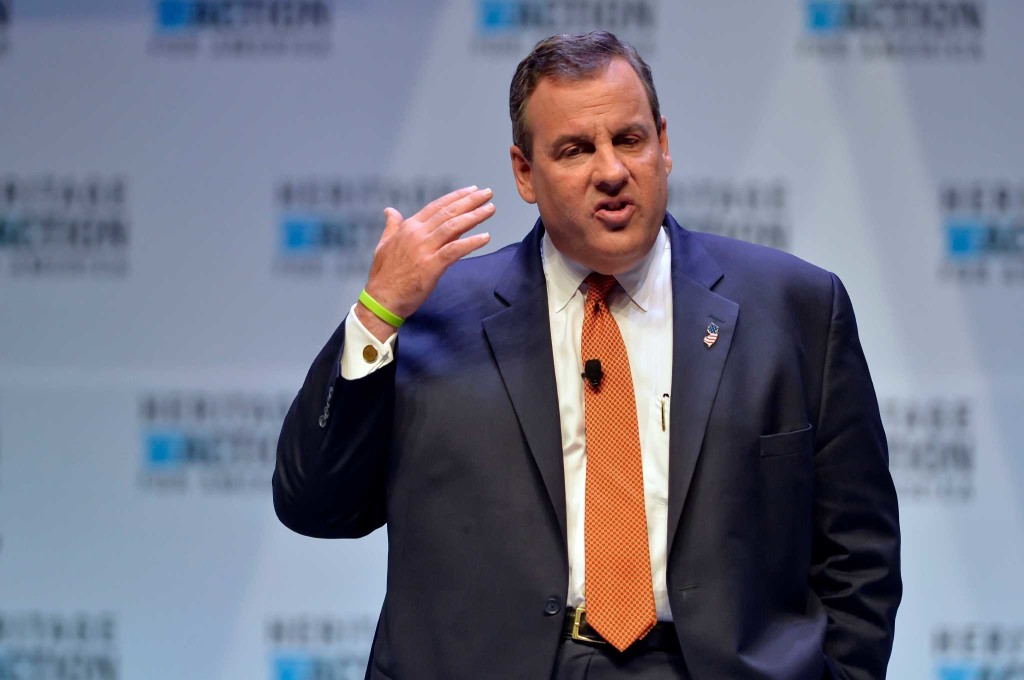
As Scott Walker gave up on his 2016 presidential race this week, he implored other Republicans in the crowded field to follow his lead and drop out – so that one could rise to challenge front-runner Donald Trump. None appears likely to do so anytime soon. Walker stood out in the GOP race with his unsustainable mix of lackluster fundraising and an expensive campaign operation. Few if any of the 15 remaining candidates feel the intense financial pressures that he did, according to a review of fundraising records and interviews with campaign staff. “We certainly don’t have a massive campaign mousetrap that we can’t pay for,” said Curt Anderson, a senior strategist for Louisiana Gov. Bobby Jindal, a presidential hopeful who, as was Walker, is at the bottom of early preference polls. “Maybe other campaigns have gotten a bit out over their skis, but no one quite like he had.” In the 70 days between Walker’s kickoff and his exit from the race, the Wisconsin governor built the kind of campaign operation that more closely resembled that of a party nominee, with nearly 100 employees. Former aides and top donors said Walker’s team crafted a pricey plan to introduce him nationwide, but struggled to raise the millions of dollars needed to pay for the strategy. “People don’t stop running for president because they run out of ideas or they run out of a desire to give speeches,” said Terry Sullivan, Marco Rubio‘s campaign manager, at a panel discussion Monday in Washington. “They stop running because they run out of money.” Walker didn’t even last long enough to file his first formal campaign finance report. The next reports are due in mid-October, and it’s then that Rubio, Jindal and others in the race will have to disclose how their fundraising – and campaign spending – is shaping up. Chris Christie, the governor of New Jersey, was known for expensive tastes while serving as a U.S. attorney and chairman of the Republican Governors Association, preferring chartered planes and luxury hotels for his past politicking. But without an influx of big campaign money and little movement in early polls, his aides say, he’s been thrifty in his three months as a presidential candidate. He generally flies commercial and has traded resorts and high-end meals for Radissons and Mexican food joints. In a fundraising pitch emailed on Wednesday, Matt Mowers, Christie’s New Hampshire director, wrote that $22 lets him invite 50 people to town halls. “Any amount helps,” he wrote. “As we keep this team `lean and mean’ we use this contribution wisely.” While Rubio’s campaign took in about $9.8 million through the end of June, far more than most of the other candidates, his operation is eager to emphasize thriftiness. Sullivan said at a Monday gathering of campaign managers that he personally must approve any expense over $500. He said Rubio almost always flies commercial – even ultra-cheap airlines on occasion. One reason the candidates seem anxious to portray themselves as penny pinchers: Not much money is coming in. The usual summertime fundraising slowdown was exacerbated this year by the dominance of Trump, the billionaire celebrity and real estate mogul who is mostly paying for his own campaign. Many reliable Republican donors are sitting on their wallets until, as Walker advocated, the contest narrows to fewer candidates. And as the departures of Walker and former Texas Gov. Rick Perry show, super PACs and their ability to raise unlimited amounts from wealthy donors can be only so helpful, because those groups are barred from taking directions from the candidate they’re helping. That means super PACs can’t legally pay for the basic expenses of running for president, such as candidate travel and official campaign employees. Most of the underdogs have been eager to portray themselves as scrappy all along. Those who, like Walker, have low-digit support in most recent national surveys have only a handful of employees and are focused on a single state, such as first-to-vote Iowa. That group includes Jindal, South Carolina Sen. Lindsey Graham, former Virginia Gov. Jim Gilmore, former New York Gov. George Pataki and former Pennsylvania Sen. Rick Santorum. “This is the survivor portion of the campaign,” said Matt Beynon, a Santorum spokesman. “You have to build an organization for the resources that you really have, not for the resources you expect or want to have.” Santorum is taking a page from his own playbook. He raised just $920,427 by the time Iowa voters caucused in January 2012. But his strategy of driving himself around in a pickup truck to each of the state’s 99 counties worked: He narrowly won. This time, he raised a little over $650,000 in his first month as a candidate. “Santorum,” Beynon said, “is a master at running underfunded campaigns.” Republished with permission of the Associated Press.
Hillary Clinton vows to defend Obamacare against GOP opposition
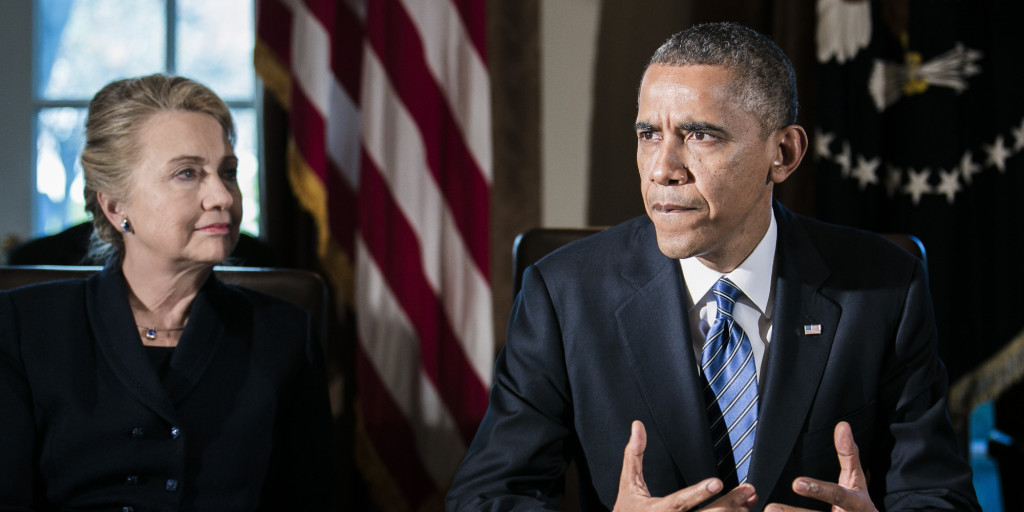
Hillary Rodham Clinton on Monday hailed President Barack Obama‘s health care law for reducing the rate of uninsured Americans and vowed to defend it against Republican opposition if she wins the White House. The Democratic presidential candidate kicked off a series of health care events with an embrace of the law, arguing that Republican resistance to the overhaul has hurt working families seeking coverage. She credited the health care law with decreasing the rate of uninsured Americans to the lowest level in 50 years. “I’m not going to let them tear up that law, kick 16 million people off their health coverage and force the country to start the health care debate all over again,” Clinton said at the Louisiana Leadership Institute. “Not on my watch…” She said that “I want to build on the progress we’ve made.” Clinton’s focus on health care comes as the share of Americans without health insurance has dipped to historically low levels due both to the law’s expansion in coverage and recent economic growth. While the law’s rocky rollout and longstanding GOP opposition caused Obama’s party headaches, Democrats seeking to succeed him are embracing the plan and talking about ways to build upon it. Vermont Sen. Bernie Sanders, Clinton’s chief Democratic rival, has called for a single-payer health care system and introduced legislation that would allow Medicare to use its large purchasing power to negotiate lower drug prices while allowing individuals to import prescription drugs from Canada, where the costs are cheaper. Clinton said she would announce a plan this week to deal with “skyrocketing, out-of-pocket health costs,” particularly drug prices. The plan, which she will discuss in Iowa on Tuesday, would cap how much a person pays out of pocket each month for medications. She took a swipe at Louisiana Gov. Bobby Jindal in his own backyard, saying he had left more than 190,000 people who would have been eligible for Medicaid without coverage because he declined to expand the program. “He put ideology ahead of the well-being of the people and the families in this state,” she said to loud boos aimed at Jindal. Jindal, who has made the repeal of the health care law a centerpiece of his Republican presidential campaign, said in an interview that it was “appropriate that the godmother of Obamacare would be in Louisiana promoting socialized medicine.” “I think that Obamacare is just a step towards more government control, more socialized medicine and I think that’s bad for us,” he said. While campaigning in Arkansas later Monday, Clinton said Jindal’s refusal to expand Medicaid disproportionately harms black Louisiana residents, and she sought to contrast Louisiana’s progress with Arkansas, where she was first lady for about a decade. Her husband, Bill Clinton, was governor of Arkansas from 1979 to 1981 and again from 1983 until his election to the White House in 1992. The Republican-led Arkansas Legislature approved the first-in-the-nation hybrid expansion plan in 2013, and Clinton noted that it’s expanded coverage to 250,000 people. “When I talk about what we should be doing, we should be looking for people to come together like what happened here in Arkansas,” Clinton told more than 1,000 people gathered at Philander Smith College near downtown Little Rock. The state’s Medicaid expansion uses federal money to purchase private insurance for low-income residents. The majority-Republican legislature voted to reauthorize the program another year at the behest of Republican Gov. Asa Hutchinson while a committee looks at the future of the expansion. Republished with permission of the Associated Press.
Planned Parenthood sues Alabama over end to Medicaid funds
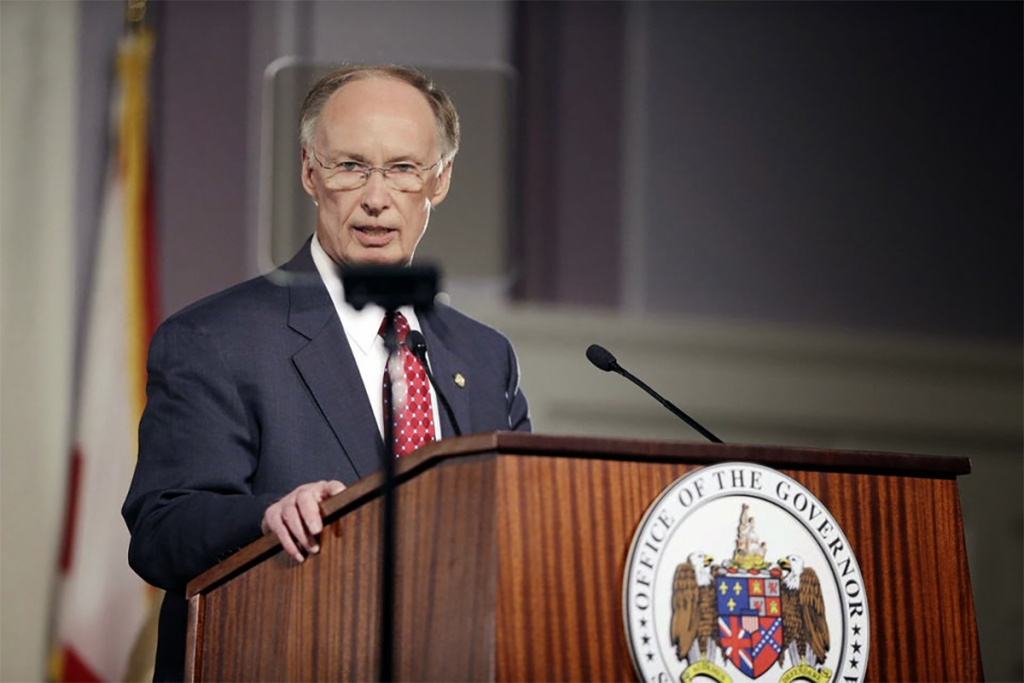
Planned Parenthood has filed a federal lawsuit over Gov. Robert Bentley‘s effort to cut off Medicaid payments to the organization’s Alabama clinics. Planned Parenthood Southeast said Friday that the move penalizes low-income women who seek contraceptive and preventative health care services at the clinics. The lawsuit was filed in Montgomery federal court. Bentley earlier this month announced he was terminating provider agreements with Planned Parenthood. The governor said he was disturbed by hidden-camera videos that accuse the organization of selling fetal organs after abortions. Planned Parenthood has denied the allegations and says the videos, shot by abortion opponents, are edited to be misleading. Bentley’s press office did not have an immediate response to the lawsuit. Planned Parenthood has a similar lawsuit against Louisiana Gov. Bobby Jindal. Republished with permission of The Associated Press.
GOP hopeful Scott Walker offers health plan with tax credits
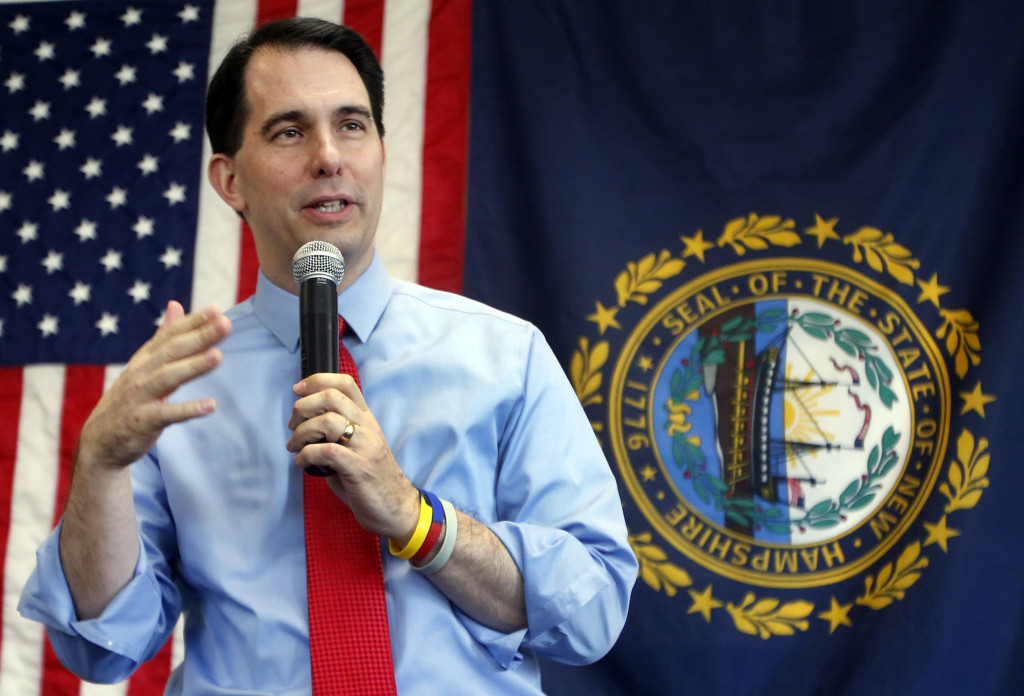
Republican presidential candidate Scott Walker‘s plan for replacing President Barack Obama‘s health care law would extend refundable tax credits to help pay for private health insurance based on age instead of income, restructure Medicaid and allow people to shop for insurance across state lines. The Wisconsin governor provided details of his proposal to The Associated Press in advance of a Tuesday speech in suburban Minneapolis where he was to outline his first major policy initiative of the presidential campaign. Walker’s plan does not include cost figures or an estimate of the number of people who would be covered, making it nearly impossible to compare with current law. For the period from April to June of this year, 11.4 percent of U.S. adults were uninsured, which translates to about 16 million people gaining coverage since the rollout of Obama’s health care law in 2013. Walker’s campaign said the plan would be paid for by eliminating $1 trillion in taxes that are levied under the current law and by making other changes to Medicaid and how health insurance is taxed. The Supreme Court in June upheld a key portion of the Affordable Care Act allowing for federal subsidies to defray the cost of coverage, a major defeat for opponents of the law. Walker and other Republican candidates have insisted they would repeal the law, starting on the first day of a GOP presidency. The biggest hurdle Walker, and any opponent of the law, faces is getting it repealed. That would take 60 votes in the Senate, and Walker’s plan does not address how he would undo the law in any other way. Walker, in excerpts of his speech released by his campaign, blamed fellow Republicans with not doing enough to repeal the law. “Republican leaders in Washington told us during the campaign last year that we needed a Republican Senate to repeal Obamacare,” Walker said in the prepared remarks. “Well, Republicans have been in charge of both houses of Congress since January and there still isn’t a bill on the president’s desk to repeal Obamacare.” Topher Spiro, vice president for health policy at the Center for American Progress, a think tank often aligned with the White House, said Walker’s plan would be a step backward. “The math only adds up if he’s slashing Medicaid and increasing taxes on middle-class people with employer plans,” Spiro said. While the Walker plan would repeal the Affordable Care Act, it appears to use some similar kinds of tools to promote coverage. For example, there would be no requirement for individuals to carry health insurance or face fines, as there is currently. But, in order to be guaranteed affordable coverage without regard to pre-existing medical problems, individuals would have to “maintain continuous, creditable coverage.” There’s merit to Walker staking out his position on the issue, even though he doesn’t explain how the law would be repealed, said economist Douglas Holtz-Eakin, president of the American Action Forum, a center-right think tank. “There’s a lot of this that is fairly standard conservative health policy reform,” Holtz-Eakin said. “The basic plan looks familiar.” Walker, similar to current law, would also provide tax credits to help with the cost of coverage for people whose employers don’t offer insurance. But unlike current law, those credits of between $900 and $3,000 would be based on age and not be keyed to a person’s income. So they may not help low- to moderate-income people as much as the existing tax breaks do. Walker’s plan calls for eliminating unspecified regulations in the current law, a move that Walker claims would lower premiums by 25 percent. Other elements of the plan would include extending a $1,000 refundable tax credit for anyone who signs up for a health savings account, allowing people to shop for health insurance across state lines, reorganizing Medicaid into smaller programs, and giving states more regulatory authority. He would also allow for new health insurance purchasing agreements and deregulate the long-term care insurance market. The reality of outright repealing the law as Walker wants to do is stark: Doing away with it completely would kick 19 million people off insurance in the first year, according to the Congressional Budget Office. Walker isn’t the first Republican to put forward a detailed plan for replacing Obama’s law. Louisiana Gov. Bobby Jindal released his plan last year and Florida Sen. Marco Rubio outlined his approach in an opinion piece published Monday. And while alternatives have been introduced in Congress, none has gotten traction as Republicans have yet to coalesce around any particular idea. Republished with permission of The Associated Press.
Martin Dyckman: Winner-take-all winner could be Trump

Our next president may well owe the office to arrogant billionaires or be one himself. Meanwhile, The New York Times reports that fewer than 400 families account for nearly half the $388-million already invested in that election still more than a year away. Did America shed blood to be rid of monarchy only to have it come to this? And yet the vast moral and political corruption unleashed by the U.S. Supreme Court’s confusion of free spending with free speech is only one of four ways in which government of the people, for the people and by the people has gone off the track. Voting districts in nearly every state are drawn by the party in power to control the outcomes. The elections themselves are monopolized by two increasingly polarized political parties, excluding the increasing numbers of citizens who want nothing to do with either of them. The elections, whether primary or general, can be won with much less than majorities by unpopular candidates who would not be the second choices of most voters. Florida is powerless to control the money. That will take a constitutional amendment or the election of a president who would insist that his or her Supreme Court nominees agree that the Buckley and Citizens United cases were wrongly decided. Florida has made inroads on the gerrymandering through the adoption of the Fair Districts initiatives five years ago and the state Supreme Court’s willingness to enforce them. But that fortunate condition is imperiled by the next four court appointments, which will be controlled by Rick Scott‘s nominating commission. Time is running very short for people who believe in judicial independence to do something about that. The “All Voters Vote” initiative petitions now circulating would break the shared monopoly of the Republicans and Democrats by allowing everyone to vote in an open primary that could nominate two candidates of the same party — or of no party — for state offices and Congress. That’s good for the growing number of voters who claim no party — presently 27 percent — or who identify with the Greens and other minor parties. To that extent, it would be a significant improvement for everyone. Jim Smith, the former Florida secretary of state and a supporter of the initiative, acknowledges that it hasn’t done much to change the lineup of elected officials in Louisiana and California, the other two open-primary states. He is right, however, in saying that it has “changed the conversation — and it’s a conversation that a broader spectrum of voters want to hear candidates talk about.” Republican candidates in districts with sizable Democratic minorities would have to think twice about toeing the Tea Party line. Democratic candidates in safely blue districts would need to court Republican votes for the first time. But “Top Two” is still vulnerable to the winner-take-all weakness. In 1991, a 12-candidate field in Louisiana’s open primary left voters with a dismal runoff choice: former Gov. Edwin Edwards, whose corruption was flagrant, or David Duke, a former Ku Klux Klan grand wizard and an avowed Nazi. There were bumper stickers saying, “Elect the crook — it’s important,” and so the voters did. Edwards went to federal prison in 2002. That same year, 16 candidates sought the French presidency. Nearly everyone assumed there would be a runoff between a conservative, Jacques Chirac, whose ethics were as suspect as Edwards’, and the prime minister, Socialist Lionel Jospin. Chirac ran first, as expected, with 19.8 percent of the vote. But Jospin was edged out of the running by Jean Marie le Pen of the far right National Front, an ultranationalist party. Although nearly two-thirds of the voters had preferred other candidates, their final options were, as in Louisiana, between two obviously unappealing politicians: a suspected crook and a presumed fascist. (Chirac won.) There’s a way to avoid such dismal outcomes. It’s called ranked-choice voting, a task that computer science makes simple. To see how simple — and have some fun — go to this website: www.fairvote.org. There are links on the page to exercises where you can cast rank-ordered votes for political parties and for the Republican and Democratic presidential candidates. Here’s how the presidential game played out for me and for other participants on Monday. In the Republican poll, Donald Trump led the first round, but with only 18 percent. Bobby Jindal ran last and was eliminated. The second-choice votes of his supporters were distributed. There were 15 more rounds, all conducted instantly by computer. Marco Rubio fell out in the 12th and Jeb Bush in the 13th. In the 16th and last round, Trump finally gave way to Rand Paul, who won the nomination with 51.28 percent support. Bernie Sanders led the Democrats with 46 percent. Hillary Clinton ran third, trailing Joe Biden, who isn’t an announced candidate. Martin O’Malley ran last, with 6 percent, and the second choices of his supporters were counted. Clinton was gone in the fourth round. In the sixth and final, Sanders’s support increased to 51.9 percent and he became the nominee. These results are hardly scientific and not necessarily predictive. The samples were small and self-selected. Anyone could vote in either race, and the biases were obviously liberal. But they’re interesting nonetheless. The two “nominees,” Paul and Sanders, project more authenticity than nearly all the others. As for Trump, he piled up more second-choice votes than everyone except Paul. If the Republican Party of Florida still insists on a March 15 winner-take-all primary, which will be well after many of the trailing and financially poorer candidates have dropped out, Trump could easily win it all. Martin Dyckman is a retired associate editor of the St. Petersburg Times. He lives in Western North Carolina.
Key takeaways from the GOP’s second-stage White House debate
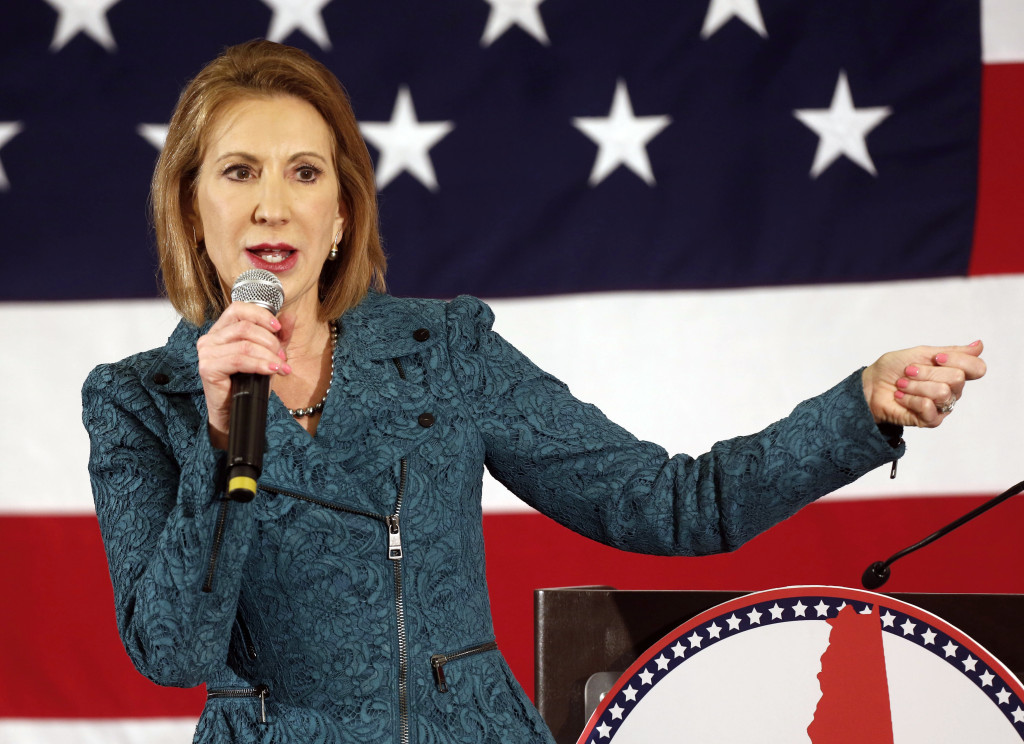
Before the first Republican debate of the 2016 campaign for president, there was the undercard: a match-up of seven GOP candidates who didn’t have the poll numbers to make the main event. It was a chance for the four current and former governors, a sitting senator from a crucial early-voting state, a former senator and the GOP’s only female White House candidate to try for the sort of hit-it-out-of-the-park performance that could vault them back into the top-tier of candidates. Here are five takeaways from Thursday’s pre-debate debate. ___ PLAYING NICE Instead of going after one another, the candidates in the pre-debate event focused on who wasn’t there: Donald Trump, Jeb Bush and, of course, Hillary Rodham Clinton. Trump, the billionaire real estate developer and former star of reality TV, took shots early from former Texas Gov. Rick Perry and former Hewlett-Packard CEO Carly Fiorina. They both questioned his conservative credentials, pointing to his past support for universal health care and abortion rights. “He is the party’s frontrunner right now, and good for him,” Fiorina said, adding later: “Since he has changed his mind on amnesty, on health care and on abortion, I would just ask, what are the principles by which he will govern?” Louisiana Gov. Bobby Jindal went after Bush by name, rejecting the idea that — as the former Florida governor has suggested — Republicans need to be willing to lose in the primary to win the general election. “Let me translate that for you,” Jindal said. “That’s the establishment telling us to hide our conservative principles to get the left and the media to like us. That never works.” As for Clinton, the former secretary of state and Democratic frontrunner? Said South Carolina Sen. Lindsey Graham: “To the people who are dying for a better America, you better change course, and she doesn’t represent the change that we need.” ___ NO OOPS MOMENTS FOR PERRY Perry entered the forum with more to prove than anyone. He just missed making the main event, denying him the chance to show a primetime audience how far he has come since his disappointing 2012 campaign. That first run for the White House more or less ended for Perry when he couldn’t remember during a primary debate the name of the third federal agency he wanted to eliminate, saying only: “oops.” Perry got the first question on Thursday night and didn’t make any gaffes during the hour-long forum. He appeared confident and well-rehearsed, especially on the issue of immigration, and repeatedly talked about his record as governor of Texas — the nation’s biggest red state. “This is going to be a show-me, don’t-tell-me election,” Perry said, adding: “And I think that the record of the governor of the last 14 years of the 12th largest economy in the world is just the medicine America is looking for.” ___ FIORINA MAKES HER MARK Fiorina, the former chief at Hewlett-Packard, didn’t have the poll numbers to make the main event, but they could rise after her performance Thursday. Fiorina painted herself as an outsider prepared to take on the status quo and delivered some of the night’s most pointed barbs against Trump, Bush and Clinton. “Hillary Clinton lies about Benghazi. She lies about emails,” she declared in her closing statement, adding that, “We need a nominee who is going to throw every punch, not pull punches.” Along with potentially convincing a fair number of viewers that she’s the candidate to do it, she also won over one of her on-stage rivals. “I will tell you one thing,” Perry said of the recently concluded talks with Iran over the Islamic nation’s nuclear program, “I would a whole lot rather had Carly Fiorina over there doing our negotiation than John Kerry.” ___ GRAHAM: WHY SO SAD? Graham is known for his deep foreign policy knowledge, but also his biting sense of humor and happy-go-lucky approach to his work in the Senate and time on the campaign trail. That Graham was missing on Thursday. Instead, South Carolina’s senior senator was consistently low-key — lacking the energy of Perry’s performance and Fiorina’s commanding stage presence. In one particularly downbeat moment, he responded to a question about how he would inspire the nation with a story of family loss. “When I was 21, my mom died. When I was 22, my dad died. We owned a liquor store, restaurant, bar and we lived in the back,” Graham said. He added, “Today, I’m 60. I’m not married. I don’t have any kids.” It’s a story Graham tells often, usually with warmth that endears him to his audience. But without a large crowd at Quicken Loans Arena to play to, it didn’t have that kind of effect on this night. ___ REACHING FOR RELEVANCE For several of the contenders, who are barely registering in early national polls, the debate was a chance to stake a claim for relevance in the crowded GOP field. Former Pennsylvania Sen. Rick Santorum, who won the Iowa caucuses in 2012, tried to do it by calling for strict new limits on legal immigration. As part of his “pro-worker immigration plan,” he called for reducing the level of legal immigration by 25 percent, claiming that “almost all” the legal immigrants who have entered the country over the last 20 years “are unskilled workers, flattening wages, creating horrible lack of opportunities for unskilled workers.” None of the others on stage, including New York Gov. George Pataki and former Virginia Gov. Jim Gilmore, had the sort of stand-out moment viewers — and voters — are likely to remember. Republished with permission of the Associated Press.
GOP debate lineup: Trump and Bush in, Fiorina and Perry out
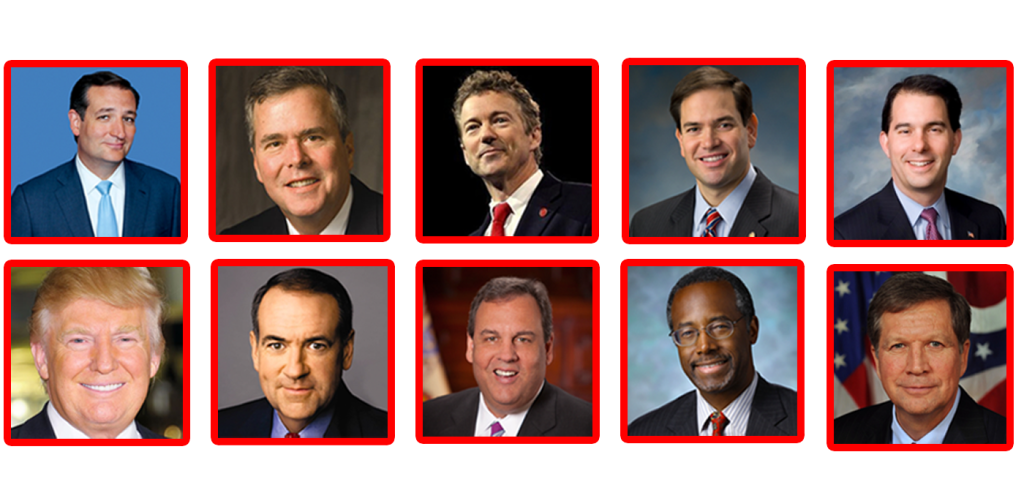
Ten candidates have made the cut for the first Republican presidential debate Thursday, with polling front-runner Donald Trump hoping for a civil evening but ready to pounce if attacked. The seven others lagging in the polls and relegated to an afternoon forum? Call them the not-ready-for-prime-time players, at least in the eyes of debate organizers. Sharing the Cleveland stage with the billionaire businessman will be former Florida Gov. Jeb Bush, Wisconsin Gov. Scott Walker, Texas Sen. Ted Cruz, Kentucky Sen. Rand Paul, Florida Sen. Marco Rubio, retired neurosurgeon Ben Carson, former Arkansas Gov. Mike Huckabee, New Jersey Gov. Chris Christie and Ohio Gov. John Kasich. Candidates with time to watch that debate are former tech executive Carly Fiorina, former Texas Gov. Rick Perry, Louisiana Gov. Bobby Jindal, South Carolina Sen. Lindsey Graham, former Pennsylvania Sen. Rick Santorum, former New York Gov. George Pataki and former Virginia Gov. Jim Gilmore. The largest field of contenders in modern memory challenged debate organizers. Fox News relied on an average of five national polls to decide the lineups for the prime-time debate and the forum four hours earlier. “We never ever envisioned we’d have 17 major candidates,” said Steve Duprey, New Hampshire’s representative to the Republican National Committee who helped craft the debate plan. “There’s no perfect solution.” Republican officials were particularly concerned about Fiorina’s status, hoping she would help balance Democratic front-runner Hillary Rodham Clinton‘s push to rally women. Trump’s recent surge in the polls, a surprise to many Republican officials, damaged Fiorina’s chances. Some Republicans fear that Trump’s rhetoric on immigration and other issues could hurt the party. “I probably am the target,” he said Wednesday on ABC’s “Good Morning America.” He said he did not want to attack any of his rivals and preferred to “just discuss the issues” in the course of a “very civil” debate. Still, he made clear that if attacked, he would have “to do something back.” Trump was far and away the front-runner in the five most recent national polls that determined the debate lineup. Several candidates were grouped together in the single digits, most separated by a number smaller than the margin of error. For example, in a Monmouth University survey released Monday, Kasich was the 10th candidate with the support of 3.2 percent of voters. But after taking the margin of error into account, Monmouth noted that Kasich’s support could be as low as 1.5 percent, while almost any of the candidates who polled lower could be that high or higher. Five more party-sanctioned debates are scheduled before primary voting begins in February. “This first debate is just one opportunity of many,” Amy Frederick, an aide to Fiorina, wrote supporters. “With many more debates to come, we fully expect that Carly will soon stand on the stage and show America what real leadership looks like.” Jindal spokeswoman Shannon Dirmann issued a challenge of sorts: “The governor will debate anyone anywhere at any time.” Candidates already began to turn their attention toward Trump. Asked about Trump while courting religious conservatives on Tuesday, Bush said the businessman’s rhetoric on immigrants is “wrong.” `’We have a different tone and a different view,” he said. “I respect the fact that he’s the front-runner for the Republican nomination,” Bush continued. “This is a serious thing. But I think to win and govern the right way – we have to unite rather than divide.” Republished with permission of The Associated Press.
Debate stage drama: GOP awaits top 10 announcement
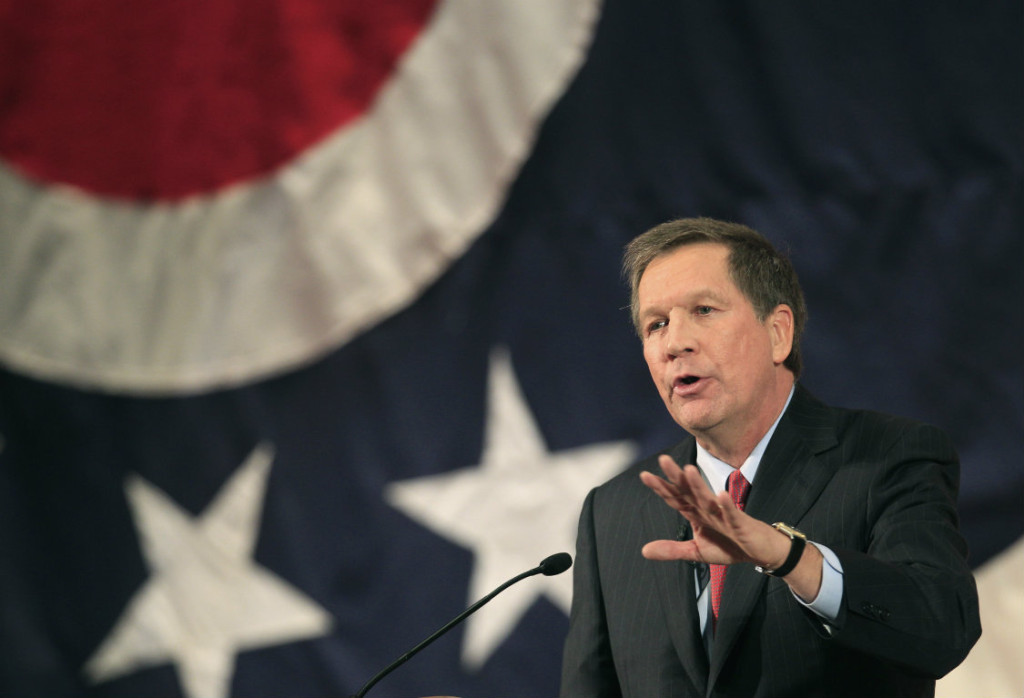
They crowded the stage in New Hampshire for a debate-style faceoff. But the jam-packed Republican field will be narrowed considerably for the first formal debate of the 2016 primary season later in the week. On Tuesday, Fox News announces which 10 presidential hopefuls can participate and the exclusive club will feature notable omissions. All but three of the 17 major Republican candidates for president participated in a New Hampshire forum Monday night that was essentially a “debate lite.” Unlike Thursday’s nationally televised debate in Cleveland, the gathering didn’t have a cut-off for participation. In their upcoming Ohio meeting, only the GOP’s top 10 candidates in national polling will be allowed on stage. “We never ever envisioned we’d have 17 major candidates,” said Steve Duprey, New Hampshire’s representative to the Republican National Committee, who helped create the GOP’s 2016 debate plan. “There’s no perfect solution.” Without exception, the candidates on Monday aimed their criticism at Democrats instead of each other in a two-hour face-off where Republicans had more in common than not. Not mentioned was the one candidate making the most news headed into Thursday’s meeting: Donald Trump. The billionaire businessman who declined to participate in Monday’s gathering is poised to take center stage later in the next meeting. Trump’s place is assured, having surged into the lead in most recent polls, yet several high-profile Republicans are on the bubble. They include the party’s only female presidential candidate, Carly Fiorina, a former technology executive whose brief surge earlier in the summer has been wiped out by Trump’s rise. And with Republican primary voting set to begin in six months, those who don’t qualify for Thursday’s nationally televised debate may struggle to stand out in the extraordinarily packed GOP contest. “Thursday’s debate will be the first debate, not the last debate,” said Louisiana Gov. Bobby Jindal, who all but conceded he wouldn’t qualify for Thursday’s affair. “We’re getting larger and large crowds, we’re moving up in the polls,” he told reporters after the New Hampshire forum. “We’re building a movement, our strategy is working — talking directly to voters.” Jindal’s fate, like that of several Republican rivals, will rest in which polls Fox uses to determine the top 10 candidates. Several surveys have been released in recent days, with more expected Tuesday, whose margins could make a difference for candidates separated by 1 or 2 points. For example, in Monmouth University’s survey released Monday, Ohio Gov. John Kasich, at 3.2 percent, was the 10th candidate, just above the cutoff. After taking the margin of error into account, Monmouth noted that Kasich’s support could be as low as 1.5 percent, while almost any of the candidates who polled lower than him could be that high or higher. Monmouth found that only five candidates — Trump, Florida Gov. Jeb Bush, Wisconsin Gov. Scott Walker, Texas Sen. Ted Cruz, and former Arkansas Gov. Mike Huckabee — are definitely in the top tier of candidates, while just two — former New York Gov. George Pataki and former Virginia Gov. Jim Gilmore — would not make it into the top 10 even when margin of error is taken into account. Meanwhile, Monday’s meeting offered a prime-time practice round for most of the would-be debaters, who addressed several contentious issues, immigration topping a list that also included abortion and climate change. Former Texas Gov. Rick Perry, another who may not qualify for the upcoming debate, called the flow of immigrants crossing the border illegally “a serious wound.” “You want to stanch the flow,” he said as his Republican rivals watched from the front row of the crowded St. Anselm College auditorium. On those immigrants who have overstayed visas, Perry charged, “You go find ’em, you pick ’em up and you send ’em back where they’re from.” Monday’s participants included seven current or former governors, four senators, a businesswoman, a retired neurosurgeon and one former senator. While Thursday’s debate will be broadcast on Fox News, Monday’s event was aired on C-SPAN and local television stations in Iowa and South Carolina — states that, along with New Hampshire, will host the first contests in the presidential primary calendar next February. After the forum, Kasich was asked about Trump’s absence. “I never thought about him,” the Ohio governor said. “It’d have been great if he’d have been here.” Republished with permission of The Associated Press.
Presidential primary brief: 470 days until Election Day
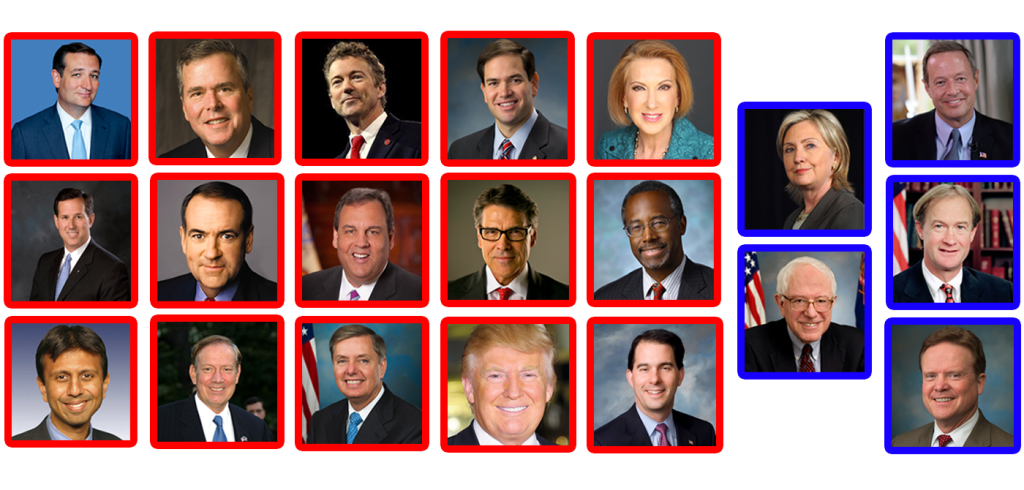
216 days until AL Presidential Primary 470 days until Election Day Convention Dates: Republican July 18-21 2016, Democratic July 25-28 2016 Weekly Headlines: John Kasich becomes 16th Republican to announce presidential bid Donald Trump surging in New Hampshire, Iowa AFL-CIO may delay endorsement of Clinton as 2016 presidential candidate Press Clips Clinton in trouble in Colorado, Iowa, and Virginia (Quinnipiac University Poll 7/22/15) Former Secretary of State Hillary Clinton is behind or on the wrong side of a too-‐close-‐to-‐ call result in match-ups with three leading Republican contenders, U.S. Sen. Marco Rubio of Florida, former Florida Gov. Jeb Bush and Wisconsin Gov. Scott Walker in Colorado, Iowa and Virginia, according to a Quinnipiac University Swing State Poll released today. Perhaps the biggest loser, however, is Donald Trump, who has negative favorability ratings of almost 2-‐1 in each state, the independent Quinnipiac University Poll Ninds. The Swing State Poll focuses on key states in the presidential election. In several matchups in Iowa and Colorado, another Democratic contender, U.S. Sen. Bernie Sanders of Vermont, runs as well as, or better than Clinton against Rubio, Bush and Walker. Vice President Joseph Biden does not do as well. C-‐SPAN scoops Fox News for First GOP candidates encounter (Latin Post 7/20/15) Three days before 10 Republican presidential hopefuls are scheduled to debate on Fox News, many of them will participate in a nationally televised forum hosted by C-‐SPAN. Steve Scully, C-‐SPAN’s politics executive producer, was not shy about touting his network’s scoop, AdWeek noted. “This event is significant” Scully said, “because it will afford the public its first opportunity to hear all of the Republican presidential candidates answer questions on one stage.” So far, the Washington-‐based network has received confirmations from New Jersey Gov. Chris Christie, former neurosurgeon Ben Carson, Ohio Gov. John Kasich, former Hewlett‐Packard Chief Executive Carly Fiorina, South Carolina Sen. Lindsey Graham and former New York Gov. George Pataki. 126 things to know about the 21 candidates running in 2016 (USA Today 7/20/15) With John Kasich’s campaign launch on Tuesday, that’s a whopping 21 candidates who have formally entered the 2016 race. (Still to come? An early August announcement by Republican Jim Gilmore, and a decision by Vice President Biden on the Democratic side.) The parade of contenders into the White House race began in March, when Texas Sen. Ted Cruz announced his bid. Since then, USA TODAY has been compiling facts and tidbits about the large presidential field to help you get to know the men and women seeking the nation’s highest office. Here are the 126 things you should know about 21 presidential candidates: #BlackLivesMatter is winning the 2016 Democratic primary (Time 7/23/15) When Black Lives Matter protestors stormed a room at a meeting in Phoenix and demanded that the 2016 presidential candidates say the names of black people killed by the police, the response was swift: Bernie Sanders did it the next day. “I wish that in the year 2015, I could tell you we have eliminated racism in this country, but you all know that is not true,” said Sanders, to a crowd of more than 11,000 in Houston on Sunday, and then listed the names: “Sandra Bland, Eric Garner, Tamir Rice, Freddie Gray and many, many others.” Donald Trump’s cash will only take him so far in 2016 (Politico 7/23/15) Donald Trump made a bold pledge during his rambling presidential announcement inside the brass-‐laden, marble-‐filled lobby of Trump Tower. “I’m using my own money. I’m not using the lobbyists. I’m not using donors. I don’t care. I’m really rich,” he said. While it’s true that Trump is really rich, the real estate mogul’s Financial disclosure made public this week casts doubt on the idea that he has access to enough cash right now to spend the $1.5 billion or more it’s expected to cost to reach the White House in 2016. Brace yourself, the presidential election is going to be all about anger (NPR 7/26/15) Hillary Clinton laid out some lofty goals for her presidency in a speech on Friday. “My mission from my Nirst day as president to the last will be to raise the incomes of hardworking Americans so they can once again afford a middle-‐class life,” she said. “This is the defining economic challenge not only of this election but our time.” So, she has her work cut out for her. But interestingly, that line came not from a populist barn burner of a speech, but from a policy-‐focused address about ending “quarterly capitalism” — the tendency for businesses to focus on short-‐term shareholder gains over long-‐term investment.
2016 Republicans use Donald Trump, TV to make debate cut

Rick Perry is attacking Donald Trump‘s credibility and branding the billionaire businessman “a cancer on conservatism.” Rick Santorum, a conservative stalwart, popped up on a TV program popular with liberals. Lindsey Graham set his cellphone on fire. With the first debate of the Republican presidential campaign approaching, the White House hopefuls are trying everything they can to improve their polling position. A candidate needs to place in the top 10 in an average of national polls to meet the criteria Fox News Channel has set to take the stage Aug. 6 in Cleveland. Those kept out risk being overlooked by voters and financial backers heading into the critical fall stretch before the nominating contests start early in 2016. “If you’re not on the stage you’re irrelevant, you don’t matter,” said Republican pollster Frank Luntz. “Unless you have some serious ad dollars, it’s not a glass ceiling. It’s a concrete ceiling.” At of this past week, former Hewlett Packard CEO Carly Fiorina, Louisiana Gov. Bobby Jindal, former New York Gov. George Pataki, ex-Pennsylvania Sen. Santorum and South Carolina Sen. Graham were outside the top 10. Others close to the edge including Ohio Gov. John Kasich, New Jersey Gov. Chris Christie and ex-Texas Gov. Perry. That would relegate them to a second-tier debate, only an hourlong airing before the prime-time event. “In your heart of hearts, you want to see me debate Hillary Clinton,” Fiorina, the only woman in the Republican contest, said with a grin, drawing applause from more than 100 people at an Ames country club Thursday. “I would of course love to be on the debate stage, but we’re going to keep going with or without it,” she told reporters afterward. “The boys are going to fight, and I’m going to keep doing what I’m doing.” One guaranteed participant is Trump, despite incendiary comments about Mexican immigrants and Arizona Sen. John McCain‘s war record. Trump’s remarks have drawn a backlash in a party trying to expand its Latino voting bloc and where national security is an influential constituency. Boring in on Trump is one approach some rivals hope will help them to break through as the debate nears. Perry unloaded on Wednesday when he called Trump’s campaign a “barking carnival act” and “toxic mix of demagoguery, mean-spiritedness and nonsense.” Perry pollster Greg Strimple said the goal of the speech was part of a long-standing effort to raise his profile, not to get him in the debate. “We had long-planned a speech defending conservatism,” Strimple said. “When Donald Trump made his negative comments, it provided us the perfect comparison.” Perry’s supporters are buying national cable ads that could boost his numbers ahead of the debate. On Friday, backers of Christie announced a new ad to air on Fox News. Graham, even further behind in polling, called Trump a “jackass” after the real estate executive said McCain was “not a war hero.” McCain served as a Navy pilot during the Vietnam War, who was captured after his plane was shot down and held for more than five years as a prisoner of war. Graham then starred in a video produced by a conservative website demonstrating how to destroy a cellphone after Trump publicly disclosed Graham’s number during a campaign appearance in South Carolina. Curt Anderson, a strategist advising Jindal’s campaign, wrote in Thursday’s Wall Street Journal that the Republican Party was sabotaging itself by controlling the debates too much, after concluding that marginal candidates dragged 2012 nominee Mitt Romney too far to the right. “They have come out to limit the number of debates we can have, they dictated who can have it, where you have it and who will moderate it,” Anderson said in an interview, adding that his complaints were unconnected to Jindal’s campaign. “The only thing left is to dictate what can be said in it.” As with Perry, an outside group supporting the Louisiana governor is buying ads on national cable just in time for the debate. Santorum spokesman Matt Benyon said Santorum’s TV appearances, including on MSNBC’s “The Rachel Maddow Show,” were timed to take advantage of the candidate’s time in New York this past week, not to boost his poll numbers. “Would it be great to be in the debate? Absolutely,” Benyon said. “But to change your campaign strategy to focus on one date in August is a pretty shortsighted idea.” Republican consultant Reed Galen said candidates may have a better chance to introduce themselves to voters in the less-crowded second-tier debate than competing with Trump and the other contenders in the main debate. Still, he understood the drive for prime time. “You get more licks in AAA-ball,” Galen said. “But the majors are the big show.” Republished with permission of the Associated Press.
New WaPo-ABC News poll shows persistent resistance from conservatives for Jeb Bush
Although the big headlines coming out of the Washington Post/ABC News poll released Monday afternoon were all about Donald Trump leading the rest of the GOP presidential field by double digits, it also indicates that Jeb Bush‘ month-long momentum may be ebbing slightly. Trump leads the field with 24 points in the national survey, Scott Walker is second with 13 percent, and Bush is third at 12 percent. Mike Huckabee is fourth in the race with 8 percent, Marco Rubio is fifth at 7 percent, Ben Carson and Rand Paul are at 6 percent, Ted Cruz and Rick Perry are at 3 percent, and John Kasich and Bobby Jindal are at 1 percent. An important caveat on the Trump rating. The poll was taken for four days last week: Thursday through Sunday. On Sunday, the day after Trump’s comment on John McCain not being a war hero went viral to a slew of negative commentary, his numbers slumped to single-digits. The poll also brings down Bush a notch. The former Florida governor has been polling strong the past month, in the weeks since his June 15 presidential candidacy announcement. In most national surveys for the past couple of weeks, he has been 1-2 with Trump. His drop to third place in this survey may indicate less a reduction in popularity for Bush than with the explanation that Walker is enjoying a bump after his official entrance into the race last week, with the poll taken just days later. Looking deeper into the poll, however, conveys some concern for Team Bush. He is still viewed skeptically by some Republicans. Twenty-two percent of Republicans say Bush’s views on most issues are too liberal for them. In comparison, only 17 percent of Republicans say Trump’s views are too liberal for them. And while a majority (62 percent) of Republicans polled say they definitely would not vote for Trump in the general election, an alarming 44 percent say they would not vote for Bush in the general election. The poll was taken before Bush’s Tallahassee speech Monday that had to warm the hearts of conservatives everywhere. Among the bullet points was a recommendation for swift and permanent cuts to federal agencies, specifically endorsing a “three out, one in” policy of replacing only every third federal employee who exits the government with the exception of “vital” areas such as national security. The Post-ABC News poll was conducted July 16-19 among a random national sample of 1,002 adults, including landline and cellphone respondents. Overall results have a margin of sampling error of plus or minus 3.5 percentage points.


